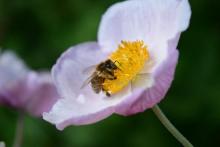5 Ways To Help Protect Bees From Extinction
Due to the recent Zika spraying, massive use of neonicotinoid pesticides, and other environmental factors, bees are now on the endangered species list, effective October 31, 2016. If bees go extinct, honey won't be the only thing we'll be missing: A third of the food humans eat would disappear with the bees. To put things in perspective, that means no more blueberries, apples, pumpkins, or almonds – all those plants (among others) need bees. Worried yet?



